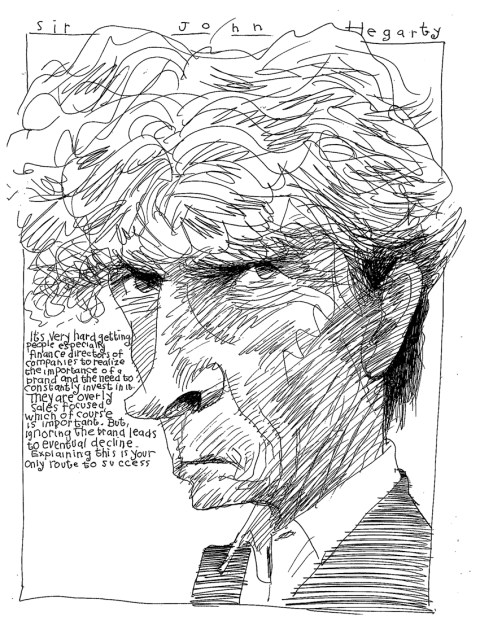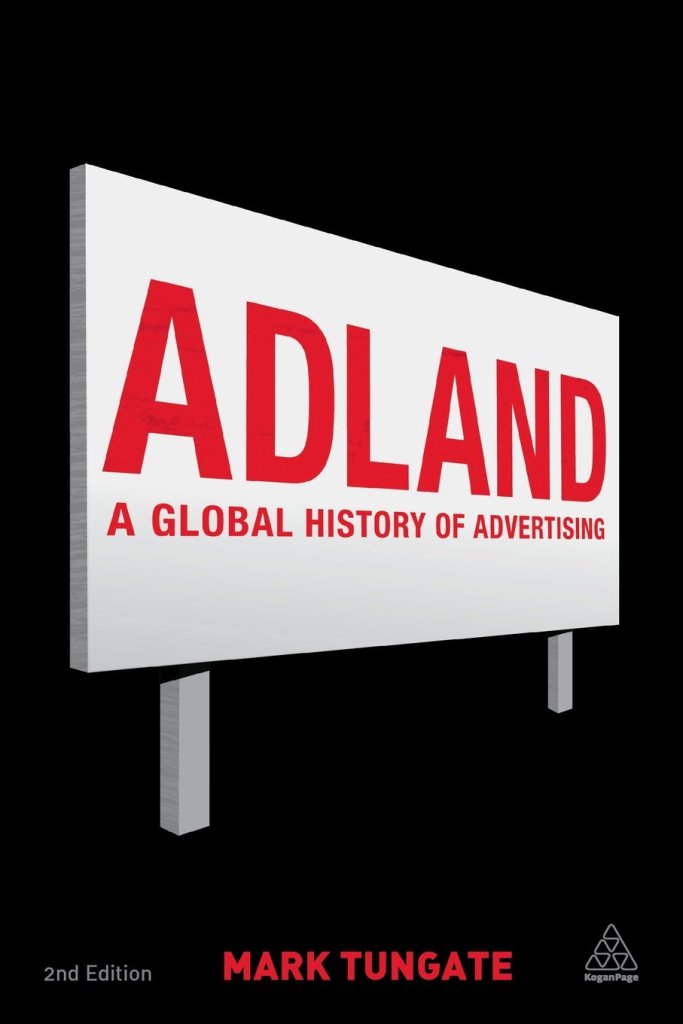
Sir John Hegarty (he was knighted by Queen Elizabeth II in 2007 for contributions to advertising) started in advertising as a junior Art Director at Benton and Bowles, London, in 1965. In 1967 he joined the Cramer Saatchi consultancy (which became Saatchi & Saatchi in 1970), where he was a founding shareholder. He left Maurice and Charles in 1973 to co-found TBWA in London as Creative Director, and left TBWA in 1982, when with partners John Bartle and Nigel Bogle, he started Bartle Bogle Hegarty. BBH has won every Agency of the Year accolade and every creative award possible and has been at the forefront of the industry ever since. Sir John himself was inducted into the Advertising Hall of Fame in 2014, and sat down briefly with us to discuss some of the ideas in his 2011 book “Hegarty on Advertising”
it’s the mind
Agency Review:
Early in the book you write that “a brand only ever exists in the minds of consumers.” We completely agree with you, and yet we find this concept exceptionally difficult for people to understand – whether those people are marketers who insist they can force a brand down the public’s throat, or simply people who think branding is all a lot of unquantifiable malarkey invented by agencies to shroud their billings in clouds and smoke and veils. So how do you convince them otherwise?
Hegarty:
It’s very hard getting people especially finance directors of companies to realise the importance of a brand and the need to constantly invest in it. They are overly sales focused, which of course is important. But ignoring the brand leads to eventual decline. Explaining this is your only route to success.
revolution redux
Agency Review:
You say the Creative Revolution came to the UK in the 60s and died – and who are we to say that it didn’t. And yet many people in advertising would point to the work coming out of the UK today and for the past decade – by Mother, by Saatchi, by BBH among others – as among the world’s most creative. So if the revolution wasn’t televised during the 60s, how’d that happen?
Hegarty:
What I said was the creative revolution that occurred in the 60s in music, fashion and film. Didn’t really come to the advertising industry until the 70s. Why? Advertising budgets were controlled by middle aged men in corporations that were disconnected from the cultural revolution that had swept through the previous decade. It took a good 10 years for these grey men to realise this was the future.
dream team
Agency Review:
You’ve been an art director, a CD, and an agency head – you’ve worked with the good, the bad and the ugly during one of advertising’s shiniest of golden ages. You’ve even opened offices on multiple continents, which means you’ve encountered a staggeringly broad range of talent during your career. Ok, so let’s see who’s on your dream team – the copywriters, art directors, hell even the account folks, planners and clients, that you worked with, wished you’d worked with, are working with, that are your all time greats. The ones that knocked your socks off, the ones who had that something special. Who?
Hegarty:
This is an impossible question to answer. Dream teams tend to turn into nightmares. Too many egos to deal with. Think of all those late 60s, early 70s rock bands that got together and collapsed in acrimony. All I have to say is Cream. Ego of course is fundamental to delivering great thinking but like anything in life, too much of it is destructive. It also has the danger of tipping into hubris, which is really bad.
anti-dystopic
Agency Review:
At the end of our review of Hegarty on Advertising, we bemoan how other memoir-slash-manifestos are dystopic about the future. How they end mired in a nostalgia for an age that probably didn’t exist and even if it did, isn’t coming back any time soon. But you, refreshingly – and perhaps, characteristically quixotically – aren’t negative about the future. You appear to be of the opinion that this is the most exciting time to be in advertising. And we couldn’t agree with you more. So why don’t others see it that way?
Hegarty:
I think as people age they sadly become more cynical. Maybe it’s to do with their belief that their best years are behind them. I’ve never brought that thought. Cynicism is a sure way of killing creativity. For it to survive it needs optimism and a genuine belief in the power of ideas to change world.
future
Agency Review:
As someone who’s had a major role in creating some of the most memorable advertising of the past 50 years, and who has such excitement about the future – what do you think the future holds for agencies? What’s the biggest hurdle they’re facing, what is the biggest opportunity to take advantage of? Or are they the same hurdles and opportunities as they ever were, just with new players, gizmos and technologies?
Hegarty:
At their heart agencies are creative organisations and as such have been changing, morphing and adjusting since their inception. So I believe they will always survive. What they’ll look like in 10 years time is anybody’s guess. But I bet they’ll still be staffed by brilliant account handlers, wonderful strategists and outstanding art directors and writers. You can always tell when an organisation is in decline. When it values process over innovation. As long as agencies remember that they’ll be here for a long time.
You can read our review of Sir John’s book here, or order it from Amazon here or from Barnes & Noble here – or pick it up at your local bookseller (find one here).
Illustration of Sir John Hegarty by the brilliant Mike Caplanis
Please be advised that The Agency Review is an Amazon Associate and as such earns a commission from qualifying purchases
You May Also Want to Read:



2 thoughts on “An Interview with Sir John Hegarty”